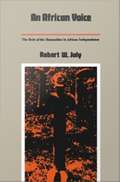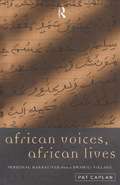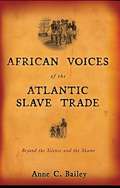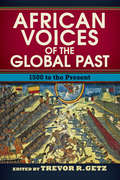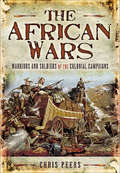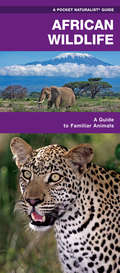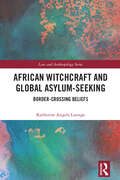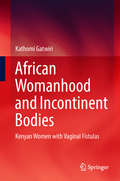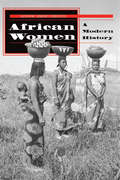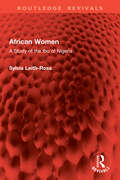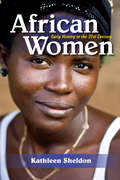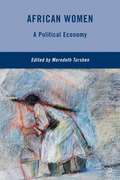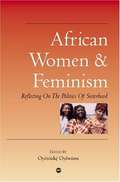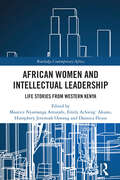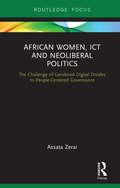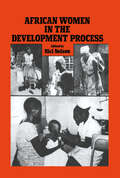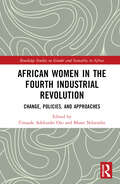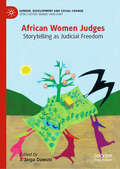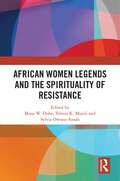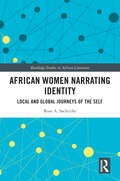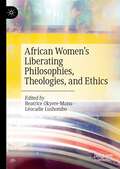- Table View
- List View
African Violets
by Sunset Publishing StaffHow to Grow African Violets discusses the history, origin, proper care and varieties of African Violets, one of the most popular houseplants of the 20th century.
An African Voice: The Role of the Humanities in African Independence
by Robert W. JulyThrough the work of leading African writers, artists, musicians and educators-from Nobel prizewinner Wole Soyinka to names hardly known outside their native lands-An African Voice describes the contributions of the humanities to the achievement of independence for the peoples of black Africa following the Second World War. While concentrating on cultural independence, these leading humanists also demonstrate the intimate connection between cultural freedom and genuine political economic liberty.
African Voices, African Lives: Personal Narratives from a Swahili Village
by Pat CaplanAfrican Voices, African Lives explores the world of 'Mohammed', a swahili peasant living on Mafia Island, Tanzania. Through his own words - some written, some spoken - and those of his relatives, including his ex-wife and one of his daughters, he enables us to see the world through his eyes, including the invisisble world of spirits which plays a significant role in his life. This information is gathered by Pat Caplan, the anthropologist, over almost three decades of talking and writing to each other. She acts not only as translator and editor, but also as interpreter, bringing in her own knowledge gathered from field data as well as comparative material from other anthropological work. By utilising a mixture of styles - narrative and life history, ethnographic observation, and the diary kept by Mohammed at the anthropologist's bequest, African Voices African Lives will make an important contribution to current debates in anthropology by grappling with issues raised by 'personal narratives', authorial authority, and with refexivity.
African Voices of the Atlantic Slave Trade: Beyond the Silence and the Shame
by Anne BaileyIt's an awful story. It's an awful story. Why do you want to bring this up now?--Chief Awusa of AtorkorFor centuries, the story of the Atlantic slave trade has been filtered through the eyes and records of white Europeans. In this watershed book, historian Anne C. Bailey focuses on memories of the trade from the African perspective. African chiefs and other elders in an area of southeastern Ghana-once famously called "the Old Slave Coast"-share stories that reveal that Africans were traders as well as victims of the trade. Bailey argues that, like victims of trauma, many African societies now experience a fragmented view of their past that partially explains the blanket of silence and shame around the slave trade. Capturing scores of oral histories that were handed down through generations, Bailey finds that, although Africans were not equal partners with Europeans, even their partial involvement in the slave trade had devastating consequences on their history and identity. In this unprecedented and revelatory book, Bailey explores the delicate and fragmented nature of historical memory.From the Trade Paperback edition.
African Voices of the Global Past: 1500 to the Present
by Trevor R. GetzGlobal historical events are too often recounted exclusively through European and American voices. African Voices of the Global Past explores six major historical developments of global significance?the Atlantic slave trade, industrialization, colonialism, the World Wars, decolonization, and the development of modern feminism?from an African perspective. Voices emerge throughout the text in the form of primary sources that explore the personal accounts of individuals. These enable students to look beyond the indistinct figures of Africans in European and American accounts to see the people directly involved and affected by the major global changes they experienced. Featuring contributed chapters from renowned scholars, many from the continent of Africa or the African diaspora, African Voices of the Global Past offers a unique view of global history from a traditionally overlooked perspective. This book is a perfect supplement for world history and African history instructors seeking to relate a compelling narrative of major world events.
African Voices on Slavery and the Slave Trade
by Alice Bellagamba Sandra E. Greene Martin A. Klein Alice Bellagamba Sandra E. GreeneThough the history of slavery is a central topic for African, Atlantic world and world history, most of the sources presenting research in this area are European in origin. To cast light on African perspectives, and on the point of view of enslaved men and women, this group of top Africanist scholars has examined both conventional historical sources (such as European travel accounts, colonial documents, court cases, and missionary records) and less-explored sources of information (such as folklore, oral traditions, songs and proverbs, life histories collected by missionaries and colonial officials, correspondence in Arabic, and consular and admiralty interviews with runaway slaves). Each source has a short introduction highlighting its significance and orienting the reader. This first of two volumes provides students and scholars with a trove of African sources for studying African slavery and slave trade.
African Voices on Slavery and the Slave Trade
by Bellagamba, Alice and Greene, Sandra E. and Klein, Martin A. Alice Bellagamba Sandra E. Greene Martin A. KleinThough the history of slavery is a central topic for African, Atlantic world and world history, most of the sources presenting research in this area are European in origin. To cast light on African perspectives, and on the point of view of enslaved men and women, this group of top Africanist scholars has examined both conventional historical sources (such as European travel accounts, colonial documents, court cases, and missionary records) and less-explored sources of information (such as folklore, oral traditions, songs and proverbs, life histories collected by missionaries and colonial officials, correspondence in Arabic, and consular and admiralty interviews with runaway slaves). Each source has a short introduction highlighting its significance and orienting the reader. This first of two volumes provides students and scholars with a trove of African sources for studying African slavery and slave trade.
The African Wars: Warriors and Soldiers of the Colonial Campaigns
by Chris PeersA military history of native sub-Saharan African armies during the late nineteenth and early twentieth centuries, exploring their training, weapons, tactics and more.In The African Wars, Chris Peers provides a graphic account of several of the key campaigns fought between European powers and the native peoples of tropical and sub-tropical Africa in the late nineteenth and early twentieth centuries. His pioneering and authoritative study describes in vivid detail the organization and training of African warriors, their weapons, their fighting methods and traditions, and their tactics. He concentrates on the campaigns mounted by the most successful African armies as they struggled to defend themselves against the European scramble for Africa. Resistance was inconsistent, but some warlike peoples fought long and hard—the Zulu victory over the British at Isandhlwana is the best known but by no means the only occasion when the Africans humiliated the colonial invaders.
African Wildlife
by James Kavanagh Raymond LeungEco-tourists, adventurers, and nature lovers will find African Wildlife to be the ideal guide to refer to on safari. The familiar elephant is one of thousands of species of animals inhabiting the diverse ecosystems found throughout region. This beautifully illustrated guide highlights over 140 familiar and unique species of mammals, birds, reptiles, amphibians and includes a map of the country's vegetation zones. This guide is an excellent source of portable information and ideal for field on safari.
African Witchcraft and Global Asylum-Seeking: Border-Crossing Beliefs (Law and Anthropology)
by Katherine LuongoThis book analyzes how over the last two decades, immigration regimes in three primary refugee-receiving states in the Global North – Canada, Australia, and the United Kingdom – have engaged with allegations about witchcraft-driven violence made by asylum seekers coming from Anglophone countries across the African continent. The work intervenes at the nexus of anthropological, historical, legal, developmental, and human rights literatures to offer fresh insights into extrajudicial violence and global migration. Taking witchcraft-based asylum cases as its focal point, it argues that the recent dramatic expansion in claims to refugee protection under the ‘particular social group’ category of the 1951 UN Refugee Convention reflects immigration authorities’ increasing willingness to consider how legally recognizable persecution can derive from cultural practices and beliefs. Reflecting critically on such cases, it advances understandings of how witchcraft beliefs and practices have persisted as significant engines of violence in the contemporary world. It sheds light both on the limits of legal pluralism and cultural relativism in asylum adjudication and on how social scientific expertise contributes not simply to the flow of ideas, but also to the channelling of people across national, cultural, and epistemological boundaries. The book will be essential reading for students and researchers in legal anthropology, African studies, human rights, transnational history, migration and refugee law and policy, and the history and anthropology of witchcraft.
African Womanhood and Incontinent Bodies: Kenyan Women with Vaginal Fistulas
by Kathomi GatwiriThis book reveals the structures of poverty, power, patriarchy and imperialistic health policies that underpin what the World Health Organization calls the “hidden disease” of vaginal fistulas in Africa. By employing critical feminist and post-colonial perspectives, it shows how “leaking black female bodies” are constructed, ranked, stratified and marginalised in global maternal health care, and explains why women in Africa are at risk of developing vaginal fistulas and then having adequate treatment delayed or denied. Drawing on face-to-face, in-depth interviews with 30 Kenyan women, it paints a rare social portrait of the heartbreaking challenges for Kenyan women living with this most profound gender-related health issue – an experience of shame, taboo and abjection with severe implications for women’s wellbeing, health and sexuality. In absolutely groundbreaking depth, this book shows why research on vaginal fistulas must incorporate feminist understandings of bodily experience to inform future practices and knowledge.
African Women: A Modern History
by Catherine Coquery-VidrovitchThis sweeping, innovative book is the first to reconstruct the full history of women in sub-Saharan Africa. Tracing the lot of African women from the eve of the colonial period to the present, Catherine Coquery-Vidrovitch sheds light on issues ranging from gender to economy, politics, society, and culture. With its breadth of coverage and clear analysis of complex questions, this book is destined to become a standard text for scholars and students alike. }Over the last century, the social and economic roles played by African women have evolved dramatically. Long confined to home and field, overlooked by their menfolk and missionaries alike, African women worked, thought, dreamed, and struggled. They migrated to the cities, invented new jobs, and activated the so-called informal economy to become Africas economic and social focal point. As a result, despite their lack of education and relatively low status, women are now Africas best hope for the future. This sweeping and innovative book is the first to reconstruct the full history of women in sub-Saharan Africa. Tracing the lot of African women from the eve of the colonial period to the present, Catherine Coquery-Vidrovitch explores the stages and forms of womens collective roles as well as their individual emancipation through revolts, urban migrations, economic impacts, social claims, political strength, and creativity. Comparing case studies drawn from throughout the region, she sheds light on issues ranging from gender to economy, politics, society, and culture. Utilizing an impressive array of sources, she highlights broad general patterns without overlooking crucial local variations. With its breadth of coverage and clear analysis of complex questions, this book is destined to become a standard text for scholars and students alike. }
African Women: A Study of the Ibo of Nigeria (Routledge Revivals)
by Sylvia Leith-RossFirst Published in 1939 and reissued with a new preface in 1965, African Women presents a study of the Ibo women of Nigeria. The originality of the book lies in the fact that practically all the information is obtained from women and that throughout, customs, laws, circumstances and happenings are described from the women's point of view.Divided into four major parts, the book discusses important themes like the Aba riots; linguistic description of Owerri province; missions and native organizations; woman in Nneato; woman in Nguru; woman in transition in Owerri Town; sophisticated women in Port Harcourt; education and other western developments; and the future of Ibo women. This is an important historical reference work for scholars and researchers of African Studies, African women, and women's studies.
African Women: Three Generations
by Mark Mathabane"This gripping saga by the author of Kaffir Boy presents a truthful, passionate, and illuminative biography of his great-grandmother, grandmother, and mother in South Africa. Mathabane vividly describes the shocking, heartbreaking stories of each generation of women as they struggle for independent incomes to support themselves and their children; while resisting apartheid, they must also resist the traditions imposed by their own society and the oppresion imposed by their men. The stories are an inspiration and tribute to millions of women worldwide in similar conditions. A thought-provoking book that is sure to deliver a strong message all who read it."--From Libary Journal
African Women: Early History to the 21st Century
by Kathleen SheldonAfrican women's history is a topic as vast as the continent itself, embracing an array of societies in over fifty countries with different geographies, social customs, religions, and historical situations. In African Women: Early History to the 21st Century, Kathleen Sheldon masterfully delivers a comprehensive study of this expansive story from before the time of records to the present day. She provides rich background on descent systems and the roles of women in matrilineal and patrilineal systems. Sheldon’s work profiles elite women, as well as those in leadership roles, traders and market women, religious women, slave women, women in resistance movements, and women in politics and development. The rich case studies and biographies in this thorough survey establish a grand narrative about women’s roles in the history of Africa.
African Women: A Political Economy
by Meredeth TurshenThis book will present three main themes of African women: African feminism, women and work, and women and politics, to inform readers of the current debates, to encourage new thinking on these issues, and to indicate areas for needed research.
African Women and Feminism: Reflecting on the Politics of Sisterhood
by Oyeronke OyewumiThe relationship between African women and feminism is a contentious one. Embedded in this connection is the question of whether sisterhood - a mantra assuming a common oppression of all women and signifying feminist international/cross-cultural relations - describes the symbolic and functional representation of African women. The contributors in this book are aware of the global discourse on women as articulated by Western feminists and interrogate the issues raised by the misinterpretation of African women of both black and white American feminists. The implications of the dominance of Western men and women in the production of knowledge about Africa are also explored. <p><p> This is one of the first collections written by African women who were born and raised in Africa and are now teaching in the United States. The papers here focus on a variety of issues including the uses and abuses of female circumcision in global feminist discourse, the problem of the criminalization approach to eradicating female circumcision, the effect of the image of the victimized African woman on development policy, and gender imperialism as a metascript of domination and oppression and as encountered by African women in the academy.
African Women and Intellectual Leadership: Life Stories from Western Kenya (ISSN)
by Maurice Nyamanga Amutabi Emily Achieng’ Akuno Humphrey Jeremiah Ojwang Dannica FleussThis book highlights the pioneering roles of African women as leaders and role models in Kenya, providing examples taken from across education, health, business, and a range of other sectors. Drawing on authentic first-hand accounts and narratives from key women in leadership positions, and those who have lived with them, the book presents the life stories of women leaders over the last fifty years, aiming to preserve their contributions for posterity and to inspire young people with moral, ethical, and progressive role models. The book uses African knowledge production strategies that look at the human being holistically, in the prism of Ubuntu, in order to define leadership in Africa from an African perspective, one that celebrates the role of the mother figure and places women at the centre of African values and societal dynamics. This book will be of interest to researchers and students of African studies, gender studies, and Kenyan education and socio-political history.
African Women, ICT and Neoliberal Politics: The Challenge of Gendered Digital Divides to People-Centered Governance (Routledge Studies on Gender and Sexuality in Africa)
by Assata ZeraiHow can we promote people-centered governance in Africa? Cell phones/ information and communications technology (ICT) are shown to be linked to neoliberal understandings of more democratic governance structures, defined by the Worldwide Governance Indicators as: the rule of law, corruption-control, regulation quality, government effectiveness, political stability/no violence, and voice and accountability. However, these indicators fall short: they do note emphasize gender equity or pro-poor policies. Writing from an African feminist scholar-activist perspective, Assata Zerai emphasizes the voices of women in two ways: (1) she examines how women's access to ICT makes a difference to the success of people-centered governance structures; and (2) she demonstrates how African women's scholarship, too often marginalized, must be used to expand and redefine the goals and indicators of democratice governance in African countries. Challenging the status quo that praises the contributions of cell phones to the diffusion of knowledge and resultant better governance in Africa, this book is an important read for scholars of politics and technology, gender and politics, and African Studies.
African Women in the Development Process
by Nici NelsonFirst published in 1981. The World Conference in Mexico City in 1975 marked the beginning of a global examination of women's roles in the economic, political and social life of their societies and a recognition of their right to participate fully and equally in all aspects of society. Most of the articles in this volume confirm, a great deal more needs to be done. Women continue to be more underfed, under educated and overworked than men ... a neglected and under-utilized minority. All of the articles in this Special Issue concentrate on sub-Saharan Africa, with the exception of Beneria's paper 'Accounting for Women's Work' which is a genera theoretical article. Most of the articles (five out of eight) in this issue deal with specific situations in which African women find themselves, ranging widely from sub-elite nurses in Zambia to the efforts of uneducated women in Nigeria to form a cooperative. Two of these articles concern the effect of development projects on women.
African Women in the Fourth Industrial Revolution: Change, Policies, and Approaches (Routledge Studies on Gender and Sexuality in Africa)
by Tinuade Adekunbi Ojo and Bhaso NdzendzeThis book investigates how women in Africa are being impacted by the Fourth Industrial Revolution, which describes the twenty-first-century proliferation of mobile internet, machine learning and artificial intelligence.The move towards digitalization brings fundamental changes in the way people work, live and generally relate to each other. However, in many areas of Africa, women face digital inclusion challenges, and their lack of access to the internet limits their social, political and economic participation in globalization. This book considers the different policy approaches taken in African countries, and their preparedness for enabling women’s participation in the Fourth Industrial Revolution, across a range of sectors.By diiscussing key topics such as artificial intelligence, technological adaptation, drones, entrepreneurship, education and financial inclusion, the book identifies positive policy approaches to ensure equitable progress towards the fourth industrial revolution at all structural levels.Making a powerful case for the benefits of inclusive digital innovation, this book will be of interest to researchers of women and technology in Africa.
African Women Judges: Storytelling as Judicial Freedom (Gender, Development and Social Change)
by J. Jarpa DawuniThis edited volume centers the voices of African women judges as agents of justice and equality. The legal and personal narratives approach in the book privileges the contributors’ lived experiences, professional trajectories, contributions and challenges. The legal narrative storytelling approach also contributes to oral histories of African indigenous knowledge production and transfer. By highlighting the substantive representation of women in African judicial leadership, the chapters examine their impact on the development of jurisprudence, judicial administration, and contributions to the rule of law, access to justice, and women's rights in contemporary Africa. This book significantly contributes to the diversity of knowledge and representation in the global discourse on gender and judging, offering a novel contribution to the growing literature on African women judges.
African Women Legends and the Spirituality of Resistance
by Musa W. Dube Telesia K. Musili Sylvia Owusu-AnsahThis volume focuses on African indigenous women legends and their potential to serve as midwives for gender empowerment and for contributing towards African feminist theories. It considers the intersection of gender and spirituality in subverting patriarchy, colonialism, anthropocentricism, and capitalism as well as elevating African women to the social space of speaking as empowered subjects with public influence. The chapters examine historical, cultural, and religious African women legends who became champions of liberation and their approach to social justice. The authors suggest that their stories of resistance hold great potential for building justice-loving Earth Communities. This book will be of interest to scholars of religion, gender studies, indigenous studies, African studies, African-indigenous knowledges, postcolonial studies, among others.
African Women Narrating Identity: Local and Global Journeys of the Self (Routledge Studies in African Literature)
by Rose A. SackeyfioThis book examines the complexities of women’s lives in Africa and the transnational spaces of Europe and North America through the literary works of key African women writers. Using a postcolonial analytical framework, the book highlights the commonalities of African women’s identities and experiences across national, ethnic, linguistic, and religious boundaries in Africa and in western settings. It collates the multi-regional narratives of key African women writers who convey how women’s lives are shaped by social, economic, and political factors at home and abroad. It also illustrates the intersection of ethnicity, class, and gender that flows through all the texts examined. Unlike existing works that explore African women’s fiction, this book uncovers the transformation from postcolonial themes of nationhood to global modalities of post-independence writing through the lens of gender. The book engages with feminist expression through broad themes including religion, war and ethnic conflict, women’s status in society, tradition and modernity and local and global tensions. A unique approach to literary criticism of Anglophone African women’s writing, this book will be of interest to scholars and students in the field of African Literature, African Studies, Women’s Literature, Postcolonial Literature, Cultural and Ethnic Studies and Migration and Diaspora Studies.
African Women’s Liberating Philosophies, Theologies, and Ethics
by Beatrice Okyere-Manu Léocadie LushomboThis volume explores the ethical and philosophical paradigms presented by most of the influential Matriarchs of the Circle of African Women Theologians. It critically evaluates the effectiveness of their ethical and philosophical theories, models, and frameworks in pursuing justice and liberation for women in Africa and globally. The authors address critical questions: How have African women theologians reimagined existing ethical paradigms? What original ethical and philosophical ideas have they generated? How have their ethical frameworks influenced the theologies and interpretations they have developed? What purposes do their ethical and philosophical paradigms serve? How do these renderings intersect with various social categories, including gender, race, class, sexuality, capitalism, and colonialism? What liberating frameworks do they propose? The volume further explores the dialogue between distinct African contexts and universal experiences and values. It explores how universal themes such as humanity, human dignity, rights, justice, motherhood, and more can coexist with communal African concepts and themes. It contemplates how embracing African approaches engages these themes more globally, bringing together particular African contexts of women and the universal ethical, philosophical, and theological theories, models, and frameworks to advance the cause of justice and liberation for African women and women worldwide into the future.

